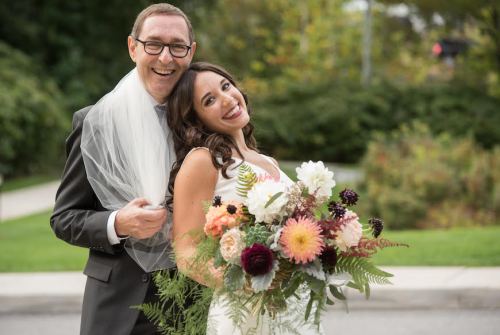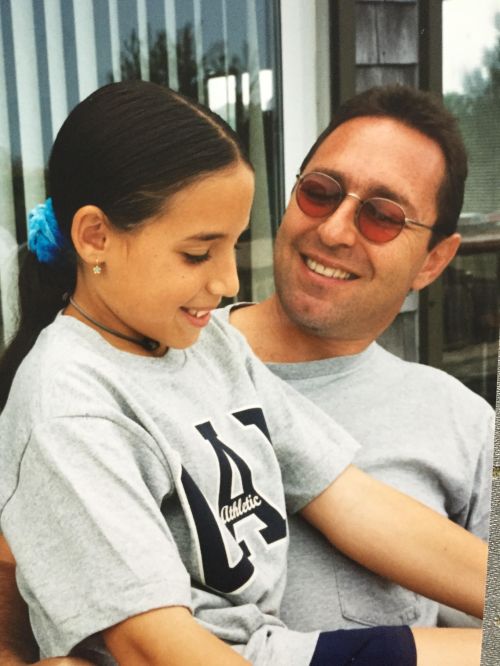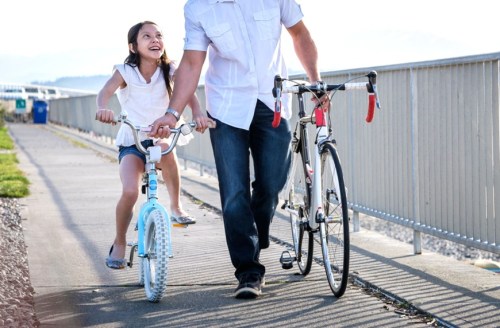To hundreds of patients, including celebs like Gwyneth Paltrow and Seamus Mullen (plus the millions more he reaches through appearances on the Today show) Frank Lipman, MD, is known as “Doctor.” And not just any doctor—he’s one of the country’s leading integrative health practitioners. But to Alison Stone, LCSW, he’s “Dad.” And in the halls of Eleven Eleven Wellness Center in New York City, he’s also her boss.
Stone, an integrative psychotherapist and certified health coach, joined her father’s practice at Eleven Eleven in 2017, six years after earning a master’s degree in social work at New York University. But this step into the family business wasn’t always the obvious next move for her.
Growing up in the ’80s and ’90s, “wellness” wasn’t exactly what you’d call cool.
Dr. Lipman literally wrote the book on incorporating healthy habits into everyday life, and he practiced what he preached with Alison when she was growing up—in moderation. “Health and wellness was always being talked about because so many of [my wife and my] friends are in the holistic health world, so Alison would hear the adults around the dinner table,” Dr. Lipman says. “But being immigrant parents with funny accents,”—Dr. Lipman and his wife, Janice, are from South Africa—”we didn’t want her to feel odd. So even though she grew up with no junk food or soda in the house, never going to McDonald’s, we never made an issue of it. We would still have ice cream—my weakness!—and indulge in birthdays.”
But growing up in the ’80s and ’90s, “wellness” wasn’t exactly what you’d call cool—“smoothie” was barely part of the regular lexicon, let alone “adaptogen.” And who would want to snack on veggies when your friends had Dunkaroos? Which is part of why Stone says she initially rebelled against this way of life. It wasn’t until she had to combat health issues as a young adult that she came around to her dad’s way of thinking.
Here’s the story of Alison’s journey to wellness—following in her father’s footsteps—in her own words.

We were the healthy house. Nobody wanted to come over because we had the worst snacks. But we were also a very active family. One of the main highways by my house would close every Sunday, so my dad and I would go on bike rides—every week. My mom doesn’t ride a bike so just the two of us would go.
Even though my mom made healthy eating easy—she’s a great cook and it’s always easier if someone is cooking healthy, delicious meals for you—I did my fair share of rebelling against it as a teenager. This is going to sound so silly in comparison to how most kids rebel, but I would go to my friends’ houses and eat the Pop-Tarts and the Double Stuf Oreos. I really pushed back against this idea of “I need to be healthy.”

Also, when I was younger, I definitely could eat differently and there were no repercussions. So you don’t really understand what it means to live a healthy life when you’re 16. I would go to school and have a bagel and a giant, half-raw cookie for lunch because that’s what everyone else is doing and that’s what I’m going to do, too. It was every day; I didn’t think twice about it.
It was only after getting older and going through my own health issues—and seeing the transformative results of taking health into my own hands—that I was like, Okay I get it now. After graduating from college, I developed a lot of skin issues. Almost 10 years later, I now know that I have rosacea and candida—both of which are linked to gut health and have symptoms that for me personally show up on my skin. As a young woman when I was really suffering, I went through 10-20 dermatologists. I tried everything short of Accutane, and when that started becoming the suggestion, I decided I’d had enough.
I started to really address my health in a way that I hadn’t before. I was already eating fairly well by the time I finished college, but through making some changes and using a more Eastern approach to diet, I was able to see, oh, this affects my body in this way and this affects my skin in this way. I’ve tried it the Western medicine way, and it didn’t work for me. I wish it had, but it didn’t.
I joined my dad’s practice at Eleven Eleven Wellness Center after getting my master’s degree in clinical social work and working in a couple different agency settings. I knew I always wanted to go into private practice, but that can be super isolating. Here, I really enjoy the team collaborative environment, bouncing ideas off of health coaches. But moreover, I was attracted to the practice’s philosophy of wellness.
At my dad’s practice—and how I understand wellness—is that mental health is one aspect of our overall wellness.
Although this is changing, the traditional view of therapy is that you go see a therapist if and when something is “wrong” with you. This is part of the unfortunate reason that seeking therapy still carries a stigma. At my dad’s practice—and how I understand wellness—mental health is one aspect of our overall wellness. And that means you don’t need to be suffering miserably in order to benefit from therapy. Yes, many are miserable and many are suffering. But most people that I see are doing well in some parts of their life, and then there are other parts of their life that they want to work on.
During the day at work, my dad and I don’t see each other that often; we’re both pretty busy and not really on a parallel schedule. But sometimes we’ll see each other between our own patients, run into each other in the kitchen, or we’ll fight about the air conditioning—he wants it off; I want it on. But outside of work, I’m very close with my parents—probably closer than most; they live nearby and I’m an only child. Sometimes my dad and I will have breakfast together at the office—we make smoothies together—but if I’m with them on weekends in the house where I grew up, we’ll have home-cooked family meals. And we’ll go on bike rides.
Want to jump-start your own healthy eating habits? Here’s how to cut out sugar and processed foods.
Sign Up for Our Daily Newsletter
Get all the latest in wellness, trends, food, fitness, beauty, and more delivered right to your inbox.
Got it, you've been added to our email list.










